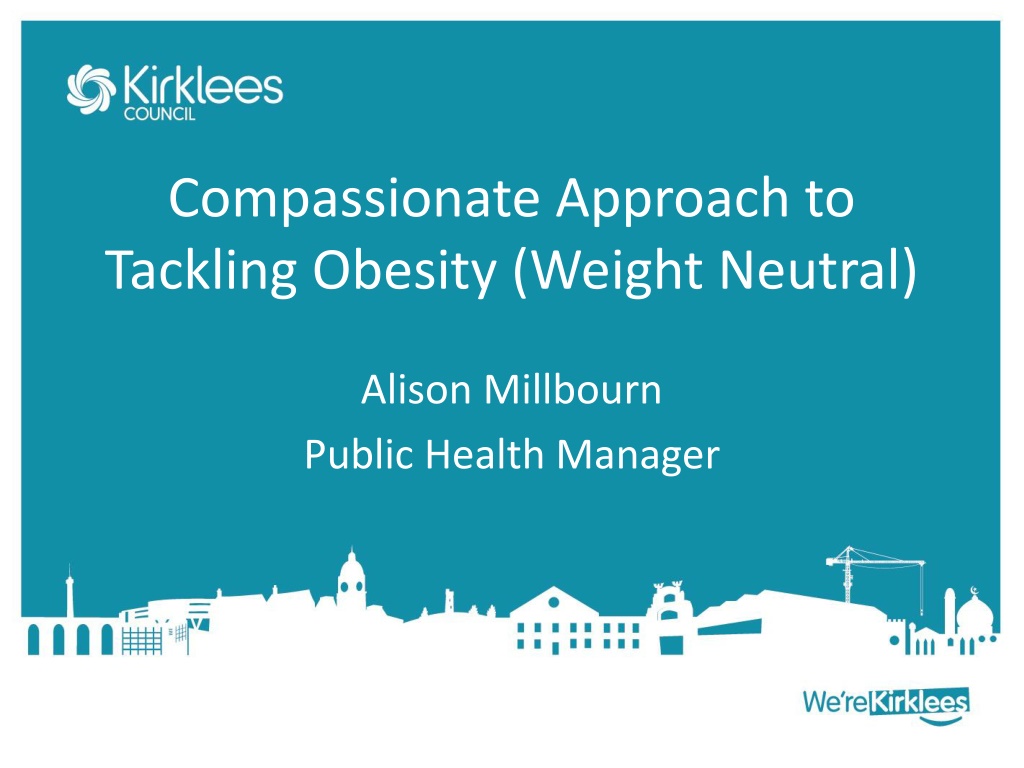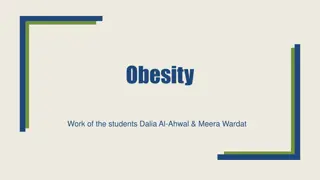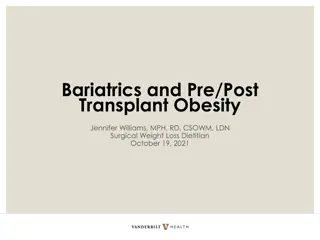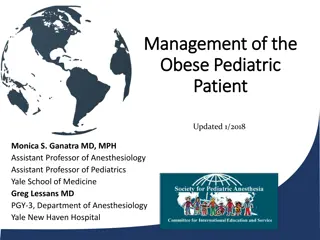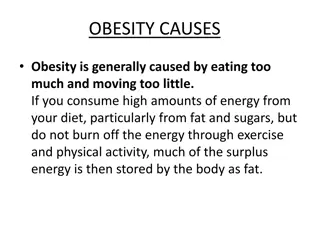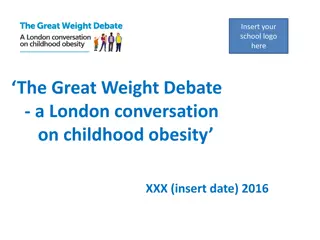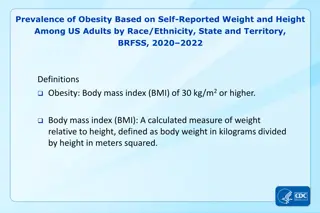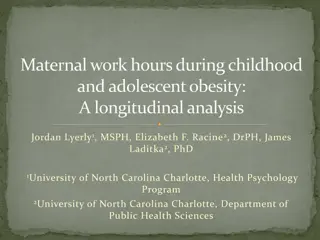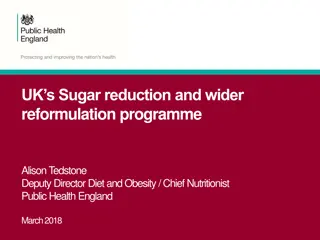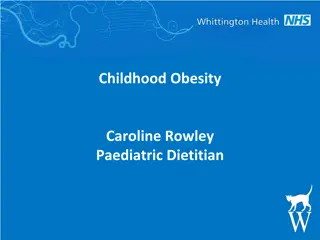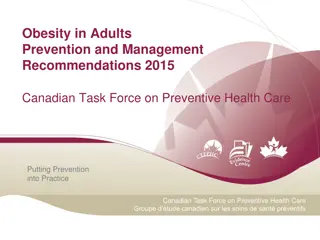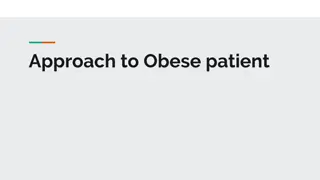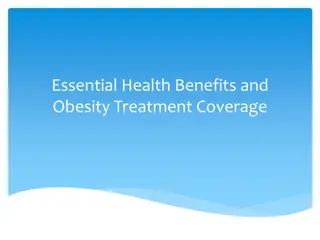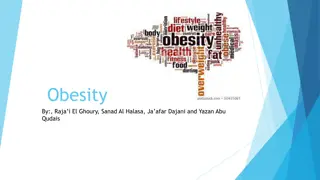Compassionate Approach to Tackling Obesity: A Weight-Neutral Perspective
Explore a weight-neutral approach to addressing obesity, focusing on compassion rather than blame. Learn why weight-neutral interventions may be more effective in promoting long-term health and psychological well-being. Shift the conversation towards improving dietary quality and physical activity for all individuals, regardless of their current weight status. Embrace body acceptance and health gains independent of weight, size, or shape.
Download Presentation

Please find below an Image/Link to download the presentation.
The content on the website is provided AS IS for your information and personal use only. It may not be sold, licensed, or shared on other websites without obtaining consent from the author. Download presentation by click this link. If you encounter any issues during the download, it is possible that the publisher has removed the file from their server.
E N D
Presentation Transcript
Compassionate Approach to Tackling Obesity (Weight Neutral) Alison Millbourn Public Health Manager
Exploring a weight neutral approach We want to try a new approach to issues of weight and health that is driven primarily by compassion, takes Click to edit Master title style blames away from individuals and fully acknowledges the mental and financial burden poverty and inequality places on people. Weight neutral is an intervention or service where weight change or weight control is not the sole intended outcome, and that often the evidence suggests that they do not necessarily lose weight ..but hear me out .
Why be weight neutral? Weight focused interventions - evidence suggests: Gains from initial weight loss not sustained over long term Click to edit Master title style Weight regained in large proportion of people over time Weight loss interventions may lead to harmful weight cycling and dysfunctional relationships with food and body Weight neutral interventions evidence suggests: Health gains maintained over longer term Better psychological outcomes No evidence of harm
Approx 90% of people in all BMI categories have room for improvement in their dietary quality, so why are we only having conversations with those with a BMI 25+ The picture is similar in terms of meeting recommended levels of PA, but we generally assume that those with a higher BMI are inactive. Click to edit Master title style Neither does BMI necessarily classify who is cardiometabolically healthy and who isn t (BP, cholesterol, insulin resistance, etc) - approx. 50% are misclassified! Obesity is mostly determined by the wider social, economic, commercial and environmental determinants of health, even if it appears to be grounded in individual behaviour. When focussing on weight loss, energy deficit is improved and it is this that in turn improves biochemical results, not the weight loss per se.
What a weight neutral intervention would look like Size accepting - encourage/enable healthy behaviours Click to edit Master title style regardless of current weight status or body shape Emphasis on body acceptance and self worth Focus on health gains and longevity boosters that are independent to weight, size , or shape e.g. Regular activity/movement Improving diet quality/better nutrition
Social support Sleep Smoking cessation Reduced alcohol consumption Click to edit Master title style Keep a process focus rather than end-goals, day-to-day quality of life Maintains a holistic focus given that health is multidimensional Increase access, opportunity, freedom. Rooted in principles of social justice, aiming to lift up the systematically disadvantaged and challenge the environmental and social structures that create inequalities
For those who chose to pursue weight loss Ultimately the wishes of the individual must be respected Can still incorporate principles of weight neutral Click to edit Master title style approaches (self compassion; joyful movement; improving nutrition etc) Be honest about pros and cons of pursuing weight loss, offer an alternative There would be some caveats, e.g. obesity during pregnancy; pre-surgery; MSK issues, etc.
An example of a weight-neutral approach Non-Diet Approach Fiona Willer Australian Dietitian developed this as a Click to edit Master title style clinical approach to her Health at Every Size (HAES) values. HAES values = Weight inclusivity Health enhancement Respectful care Eating for wellbeing Life enhancing
Weight Inclusivity: Accept and respect the inherent diversity of body shapes and sizes and reject the idealizing or pathologizing of specific weights Click to edit Master title style Health Enhancement: Support health policies that improve and equalize access to info and services, and personal practices that improve human well- being, including attention to individual physical, economic, social, spiritual, emotional and other needs
Respectful Care: Acknowledge our biases, and work to end weight discrimination, weight stigma and weight bias. Provide info and services from an understanding that socio-economic status, race, gender, sexual orientation, age and other identities impact weight stigma, and Click to edit Master title style support environments that address these inequalities Eating for Wellbeing: Promote flexible, individualised eating based on hunger, feeling full, nutritional needs, and pleasure, e.g. intuitive eating rather than any externally regulated eating plan focused on weight control. Life Enhancing Movement: Support physical activities that allow people of all sizes, abilities and interests to engage in enjoyable movement, to the degree that they choose
Finally. Assumptions are made that heavier people are unhealthy, this is not necessarily so Weight loss through dieting is not sustainable over time We would be acting on behalf of our population if we centralise Click to edit Master title style health for people at all points along the weight continuum and work to eradicate stigma in all settings, including healthcare Weight loss leads to body pre-occupation, distracts from other health goals and wider determinants, reduced self-esteem, eating disorders, other health decrement, weight stigmatisation and discrimination It would negate the need for people to have embarrassing conversations about weight with adults and children. It would be a more positive conversation about health. NCMP
Want to know more? Click to edit Master title style https://www.openlearning.com/healt hnotdiets/courses/introduction-to- the-non-diet- approach/homepage/?cl=1
